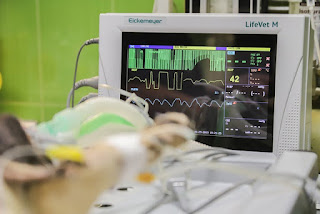ECG / EKG Machine: Revolutionizing Cardiovascular Diagnosis
 |
| ECG / EKG Machine: Revolutionizing Cardiovascular Diagnosis |
Advancements in medical technology have transformed the field of healthcare, enabling healthcare professionals to provide accurate diagnoses and effective treatments. One such innovation is the electrocardiogram (ECG or EKG) machine, which plays a vital role in diagnosing and monitoring cardiovascular conditions. This article explores the features, functionality, and significance of ECG machines in modern healthcare.
Understanding ECG / EKG Machines
An ECG machine is a medical device that records the electrical activity of the heart. It detects and measures the electrical impulses generated by the heart's muscles during each heartbeat. These impulses are captured through electrodes placed on the patient's chest, limbs, or both. The machine then produces an electrocardiogram, a graphical representation of the heart's electrical activity.
Features and Components
ECG machines consist of several components, including electrodes, lead wires, an amplifier, and a display screen. The electrodes are attached to specific locations on the patient's body to detect the electrical signals. Lead wires transmit these signals to the amplifier, which amplifies and filters the signals before displaying them on the screen. Some advanced ECG machines also include additional features like wireless connectivity and storage capabilities for enhanced data management.
Functionality and Interpretation
The primary function of an ECG machine is to provide valuable diagnostic information about the heart's electrical activity. It helps healthcare professionals identify abnormal patterns or irregularities in the heart's rhythm, detect heart disorders such as arrhythmias, ischemia, and myocardial infarction (heart attack), and monitor the effectiveness of certain cardiac treatments.
Interpreting an ECG requires specialized knowledge and expertise. The ECG waveform consists of various components, including the P wave, QRS complex, and T wave, each representing different stages of the cardiac cycle. By analyzing the shape, duration, and intervals between these components, healthcare professionals can diagnose specific heart conditions and make informed treatment decisions.
Significance in Healthcare
ECG machines are invaluable tools in cardiovascular healthcare. They play a crucial role in both diagnostic and monitoring settings. Early detection of cardiac abnormalities allows for timely intervention, which can significantly improve patient outcomes. ECG machines are commonly used in hospitals, clinics, emergency departments, and ambulances to assess patients with chest pain, palpitations, or suspected heart conditions.
In emergency situations, ECG machines help determine the severity of a cardiac event and guide appropriate interventions. For example, in the case of a heart attack, the ECG can reveal the location and extent of the damage to the heart muscle, aiding in the decision-making process for immediate treatment options such as thrombolysis or percutaneous coronary intervention (PCI).
Advancements in ECG Technology
Over the years, ECG technology has advanced significantly, enhancing the accuracy, portability, and ease of use of ECG machines. Portable and handheld devices now exist, allowing healthcare professionals to perform ECGs at the patient's bedside or even in remote locations. These advancements have expanded access to cardiac care, particularly in underserved areas or during emergencies where immediate diagnosis is critical.
Furthermore, computer algorithms and artificial intelligence (AI) have been integrated into ECG machines, enabling automated analysis and interpretation of ECG data. AI algorithms can detect subtle abnormalities that may be missed by human observers, improving diagnostic accuracy and efficiency. This technology holds great potential for early detection and proactive management of cardiovascular diseases.
Conclusion
ECG machines have revolutionized the diagnosis and monitoring of cardiovascular conditions. Their ability to accurately record and interpret the heart's electrical activity plays a vital role in detecting abnormalities, guiding treatment decisions, and monitoring the effectiveness of interventions. With continuous advancements in technology, ECG machines are becoming more portable, user-friendly, and integrated with AI algorithms, enabling improved access to cardiac care and enhancing diagnostic accuracy. As a result, these machines have become indispensable tools in modern healthcare, saving lives and improving patient outcomes.
Related Searches:
- ecg machine,
- portable ecg machine,
- ecg machine portable,
- 12 lead ecg machine,
- portable 12 lead ecg machine,
- welch allyn ecg machine,
- ecg machine price,
- philips ecg machine,
- ge ecg machine,
- ecg machine for sale,
- mortara ecg machine,
- mac 1200 ecg machine,
- which part of an ecg machine moves against the tracing paper to record the waves of the ecg cycle?,
- portable ecg machine for home use,
- which of the following is not part of the control panel of an ecg machine?,

Post a Comment for "ECG / EKG Machine: Revolutionizing Cardiovascular Diagnosis"